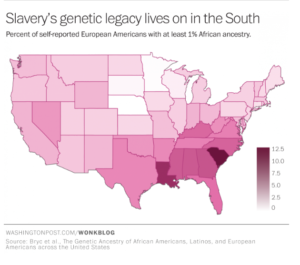Many Americans who described themselves as white received interesting news when it was revealed that a large portion of whites, especially in the South, have African ancestors from less than seven generations ago, according to a new study.
Due to the history of slavery in the South, it’s no surprise that many Southern white people actually have African ancestors. But those ancestors may not be as far back on the family tree as they assumed.
The study conducted by 23andme gathered genetic records of 145,000 people who also submitted cheek swabs.
The results revealed that about 3.5 percent of the self-described white Americans across the country had at least 1 percent or more African ancestry.
In order to have 1 percent African ancestry, that African ancestor had to be no greater than seven generations down the line.
Southern states likes South Carolina, Louisiana, Georgia and Mississippi had some of the highest concentrations of European Americans with at least 1 percent African ancestry—a modern day marker of the South’s past deeply rooted in slavery.
Many slave masters would rape enslaved women, which was illustrated by the study’s increased likelihood of that African ancestor being a female rather than a male.
This isn’t the first time that a study released by 23andme revealed that many Americans are a little more racially diverse than they had previously imagined.

The study also revealed interesting numbers about how people tend to identify themselves.
Most people who were 15 percent or less African decided not to identify themselves as African-American but nearly everybody who was at least 50 percent African did.
Between those numbers, however, results varied greatly.
The study served as a reminder that labels of Black and white have greater cultural implications than they do biological ones.
Even when it comes to issues of health, the findings complicate the idea of one race being the most common carrier for certain illnesses and conditions because many of these people actually have mixed heritage of which they initially weren’t aware.


